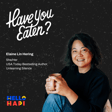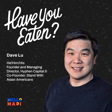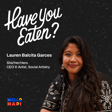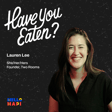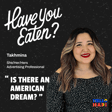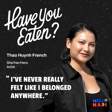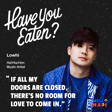Become a Creator today!Start creating today - Share your story with the world!
Start for free
00:00:00
00:00:01

"You're Not Buying a Toy From a Store."-Grace Yung Foster on Her Adoption and Foster Care Experience
Through a series of dynamic and thoughtful conversations between Ji Bowlus (she/her) and guests, we will showcase how wellness intersects with the rich complexities of our diverse Asian diaspora community. We will bring the voices of the Asian diaspora from the peripheral to the center to empower, reclaim agency, and rewrite the narrative of well-being one personal experience at a time.
Transcript
Introduction to 'Have You Eaten?' and Guest Grace Young Foster
00:00:00
Speaker
nourishing the mind, body and soul for the Asian diaspora. Have you eaten? Hey, hello, happy fam. Welcome back to have you eaten where we have conversations with our community members to amplify and to regain our narratives one conversation at a time. And today I am so excited to have grace young foster with us. She is the founder of the inclusion initiative where she does a lot of amazing work with adoptees of color and foster care alumni. Uh, welcome grace.
00:00:33
Speaker
Hi, thanks for having me. It's so nice to be here. Yeah. Um, so we always start with, um, how do you identify? And that could be anything from pronouns to ethnicity to however you identify. Yeah, no, thank you. Um, well, I identify as she, her, and I am a Korean adoptee, but I'm also a foster care alum. And I'm, and like you said, a founder. I'm also a mom and a partner and many, many other things. And I just, I love this, the themes of these conversations, right? Where we're reclaiming our narratives, really empowering each other to ah be able to express our full identities. So thank you so much for creating this space.
00:01:27
Speaker
Yeah, and thank you for being here and um I'm just going to get right
Personal Connections and Themes in Grace's Writing
00:01:32
Speaker
into it. You know i you have a blog that you write um and I read a few pieces of yours and so many things that you've said, even though I'm not a Korean adoptee or from the foster care system, um there's just so much that you talk about that resonates with me so much as being um a Korean American and an immigrant. then like immigrants um and just just so you're aware, and I don't think our audience knows this, but ah my mom actually left me when I was four years old. And wow um while I you know was raised by my father, um I didn't have a female role model in my life growing up.
00:02:18
Speaker
um And so I think a lot of times I feel this connection um with you and and others that I meet throughout this work. um So I want to thank you for your writing and thank you for being so vulnerable and sharing your honest truth. um So to start, tell us about your organization.
The Inclusion Initiative: A Tech Platform for Adoptees
00:02:41
Speaker
It's fascinating. Yeah, well, I just want to say thank you for sharing that with me. and um You know, being in community with me that way, I think, you know, it leads to the organization I'm building. Uh, you know, the more that we can share with each other, right? The diversity of our experience and the more we amplify each other in that way, the more we realize like you and I exactly right now that we're more alike than we are different. And that's like the beauty of these conversations. And it's why I built the inclusion initiative.
00:03:15
Speaker
And so we're a tech-based platform that is elevating the future of work for adoptees of color and foster care alumni, because specifically there was such a gap in community, resources, mentorship, and just plain visibility of people who are adopted and people who have experienced foster care in these workplace systems, right, that are focused on and rightfully so, focused on the diversity of their workforce. But time and time again, throughout my 15 plus years in, you know, in the workplace, I have never seen a group, an initiative, a program dedicated to people with my specific lived experience.
00:04:06
Speaker
And so I would join organizations within the organizations that supported Asian people or parents, right? I'm a mom or, you know, different types of things like that. But every time I would go into these spaces, my experience as an adoptee, especially an adoptee of color, my experience as a foster care alumni, it created differences in how I experienced being Asian, and how I experienced being a mom, and how I experienced these different things that I couldn't really bring up because it's not always a safe space to talk about those particular things. and It doesn't always resonate with people right that don't share that lived experience because adoption and foster care really kind of like idealized kind of like
00:05:04
Speaker
fairy tale concepts to people where kids get quote unquote saved and rescued, put into homes, and then their problems are solved the end happy ending. And for some that is true. For many others, there's a lot more nuance and complexity that happens when they enter homes and experience life in these homes, especially if they're an adoptee of color or foster youth that is put into a home or sorry a foster youth of color but is put into a home that is um but that is led by white parents, right? And if you're in a predominantly white community raised by white parents and you're a person of color, it creates a lot of um confusion.
00:06:03
Speaker
and internalized um complexities of rejecting where you come from, rejecting what you look like, not being able to accept yourself or others around you, right? Not accepting you because you are so different. And so all of these types of experiences, as you saw right in my writing, it really shapes how we view the world, how we view ourselves and how that shows up in places like work. And so the inclusion initiative is designed to create visibility of these experiences and to help others around us understand, right? Like we share commonalities of not feeling like we belong, that we're in in between spaces.
00:06:55
Speaker
that we are immigrants, you know, that we have experienced um things that other communities have, but that we also want support. And we're seeking resources as adults after after we leave our homes, you know, after we have come into our own, you know, we still need that support community and care like many other groups that are facing their own challenges. Right. And so, um That's what the Inclusion and and Initiative is designed to do, in addition to really creating a robust community and network and connection amongst people with lived experience as adopters of color and foster care homes. Because we need each other.
00:07:43
Speaker
Yeah, absolutely. And that sounds amazing. And for those of us who don't have that lived experience, ah by the way, I also love how you start your writing, where it very specifically says it's your story, you're reclaiming your narratives and that everybody's experience and um lived experience may be different. And so that said, can you share a little bit about your background and um
00:08:13
Speaker
you know that What I'm sensing is there's a lot that's happened, and I've read some of it, um but to share with our audience, like can you share a little bit about your lived experience and what's led you to today? Yeah. so Thank you for amplifying that because it is so important that all of us that have experienced it within these different communities, that we do recognize that Not everyone shares our exact experience. And that creates diversity within our communities that is important to honor and important to acknowledge because that's what makes up our entire community. And so it also right helps us fight against the dominant narratives and the dominant tropes that doesn't particularly reflect right how we go through and experience these things.
00:09:10
Speaker
So in adoption and foster care, that is very, very true.
Grace's Adoption Journey
00:09:15
Speaker
The different homes were placed into the different countries or states that we come from, you know the different socioeconomic ah statuses that we experience in the homes that we're in or the homes that we've left. like This all is different for all of us. And so um I'll just share, you know I am, like I stated, a Korean adoptee. so I don't know that I was born there, but that is where I have come from. And many, many Korean adoptees actually have records that are not complete or they're falsified or they just don't have them. And so we have a lot of gaps in our stories, but so that's why I say like, that's where I come from. I'm not sure if I was born there. And for me, um,
00:10:07
Speaker
you know, my age is unknown, my birthday's unknown, my name is unknown, right? All these things were made up for me by the government, by the systems, you know, that placed me into care. And so this is true for so many adoptees that are international ah trend and transracial adoptees. So I was found, according to my records, in a local market in Busan, And I was estimated to be about three years old and I was just found alone. And it was clear that I was alone and, you know, there's no one coming for me. It was a common occurrence in the 80s. And so the police took me to the police station, processed me, did paperwork, you know, took photos, whenever it was, and then handed me over to, you know, the state entity.
00:11:06
Speaker
and I was placed into an orphanage. And I was in an orphanage in Busan for a while, and then transferred to Seoul to a different orphanage, because at the time, the idea was, you know, if we can place kids into Seoul, they might have a better chance of being adopted, because it's a big city, right? And ah Western countries, including America, right, are more um
00:11:37
Speaker
might be more prone to adopting from Seoul than smaller cities in Korea. So I stayed in orphanages for about two years. And I remember the day I was told I was going to be adopted into the States. And it's just such a weird, surreal memory. But, you know, the the ah the caretakers and the orphanage. whom I did not have good experiences with, right? i you know Orphanages at the time, I'm not sure what they're like now, but at the time, it's really tough, rough environments, as you read in my writing. And it's simply due to probably the lack of resources they had, the lack of support they had, right? but So that trickled down into how the kids experienced their time there.
00:12:35
Speaker
Um, and so I did not enjoy my time in the orphanage. I really strongly remember that I talked about it a lot, according to, you know, some of my paperwork. I talked ah a lot about how I really disliked it and felt mistreated. But yeah, there was just a lot of, um, hard things that the kids all around me had to go through. But when one of the caretakers pulled me aside, you know, I was terrified that I was going to be disciplined because I was like a big thing in the orphanage. And just part of the culture, I think, of Korea at the time. I could attest to that. That is true. Yeah. So I thought I was going to be hit, you know, and I was bracing for that. But she pulled me aside and said, you're going to America. There's a family that wants you in America.
00:13:29
Speaker
You know, and these are like my memories. So I'm not sure what the exact words were, but this is how I remember it. And they gave me felt. Well, they gave me this purple and white dress that I still have had the 80s puff sleeves and stripes. And I remember just touching it because I hadn't owned anything. You know, my clothes, were I didn't have clothes. Like I had what I was wearing. I didn't have clothes. And so like that, having something that was mine like that was just, you know, I didn't know, I had never had a dress before in my memory. So it was just, it was, I knew this was something different, something really special. I didn't quite understand what was happening, but I knew I was leaving the orphanage. Let me tell you, I was really, I felt really happy about that. I remember being, ah there being a lot of joy about that.
00:14:28
Speaker
I was given shoes, white stockings. I was given a bag that has Korean writing that I still have. I plan to give it to my daughter when she's a little older. And I just remember thinking, I get to live a new life and I'm getting out of here. And long story short, I eventually flew over with a couple of escorts and landed in Wisconsin. So that was where the family that wanted to adopt me lived. And that was a surreal experience too, because it was really the first time I remember seeing like cars.
00:15:18
Speaker
and white people and the airplane, like air an airplane was a big deal. Like all, like these memories are starting to flood back right now. Yeah. And you flew back, you flew here by yourself. I flew with escorts. So they have, you know, I was very little. So they had escorts that do that um from Korea. So, um, I don't remember them. I don't really remember the plane ride. But I remember going into the parking lot and meeting this family that was going to adopt me. For the first time? that's Yeah, i don't I don't know if they had visited the orphanage before. I'm not sure. um That was kind of the um you know the standard procedure back in the day, but I'm not sure if they had to do that or not. But there was a white dad, an Asian mom,
00:16:13
Speaker
and a couple of their kids, their biological kids. And I got into their car and the first thing they did was they hand me a bunch of candy. I had no idea what it was, but it was delicious. I remember just being like over the moon. I was like, I had the best time in that car ride. And I arrived to the home and It was the first time I had walked into a home in my memory. Like it was, I was constantly being like communicated to like, I didn't understand English yet, but I was, I knew they were telling me like, this is your home. Like you're living here. They showed me my bedroom. I had my own bedroom for the first time. I had a bed. I had all these clothes, all these, I was completely overwhelmed because I had no idea what all this stuff was.
00:17:11
Speaker
And I used a bathroom for the first time. like it was just I remember all of these things. And I even remember I fell into the toilet the first time I used it, because I didn't know how to use one. This is how it goes. Yeah, ah just it's pretty. When I think back, I'm like, I can't believe I remember all of that. But it makes sense, right? Because it was such a unique, profound experience. for a kid of that age to have these kinds of experiences for the very first time. yeah Like my kid, you know, takes it off for granted because it's all she's ever known as being surrounded by all this. But for me, I went from, you know, sleeping on floors and not having food to like, just this abundance. And I just had never seen anything like that before. And I was really, really happy. And um the fairy tale
00:18:11
Speaker
You know, that's like the fairy tale ending that you hear a lot of times. And that's usually where the story stops, right? She made it. She was loved. She had the best life happily ever after the end. um And again, it does happen for adoptees and foster youth, but many, many of us have a much more to our story afterwards.
Rejection and Self-Protection in Adoptive Family
00:18:35
Speaker
And for me, what happened was about two years later, I had not been officially adopted yet and ah the family decided that they didn't want me anymore. ah And it was a whole list of things, but basically at the time, right education about adoption, education about trauma, education about separation and the impacts of that on on these kids right that were abandoned, orphaned or taken away from their families,
00:19:11
Speaker
It wasn't a part of the whole process for parents who were looking to adopt. They were not educated about these things. The countries um did not communicate these things. The systems did not communicate these things. um And not that all of the blame is on one party or the other, right? Parents should also try to be as diligent as possible in understanding what they're getting into. when they're looking to adopt or foster kids. You're not buying a toy from a store. Well, yeah, we're people. Yeah. And if you I mean, it makes sense, right? That intense trauma that we experienced, we had lives that they could not have even imagined and we couldn't communicate it to them because we were too little. So they had no idea what we had gone through. And I was estimated to be five years old by the time I got to them.
00:20:08
Speaker
That was five years of trauma. ah So my god the way that I presented as a child was different than the fairy tale child that they thought they were getting. And I had just, you know, I ah acted out because of my trauma in various ways. I was withdrawn. I was scared. I didn't trust. I hoarded things. you know I had attachment issues, clearly. I didn't know you know i had to learn right how to behave in the Western social cultures and norms. I had to learn English. They threw me in school right away, like just compound compounded thing after thing that obviously impacted me. And I needed support in a very different way than a normal five-year-old. So by the time I was seven, right they had they felt like they didn't
00:21:06
Speaker
have the capacity to care for me. um You know, I remember the day they relinquished me. Well, when they told me they were going to relinquish me, they they took me into their bedroom, like the seven year old kid, I had my pajamas on. It was right before bedtime. And they sat me down and said, like, Grace, you're a bad kid. We don't want you anymore. And you're leaving in two days. And
00:21:37
Speaker
You know, people always say to me like, gosh, how can you tell that like this? Like, how are you not like bawling and crying and just emotional? It's like, well, this it is what happened to me. You know, I had to go through it and I've lived with it for all these years. This is my story. This is my life. And I remember just being and so like fragile at the time, really hurt. But i I didn't really know what that meant. i All I heard was, right, we don't want you anymore. You're a bad kid. And that stayed with me for a very, very, very long time. Right. And it began the cycle of what you read in my writing. Right. Having a mask, protecting myself, being a people pleaser, overachieving, being stoic, all these things, just building these walls. Right.
00:22:34
Speaker
to protect myself from that experience happening ever again. And yep, two days later, I left and the social worker came and got me. um they The parents you know sent me off, but there was very little emotion. There was very little anything, right? It was clear that that was really what they wanted. like They just did not want me. There was no crying. There was no hugging. um it's just was a really It felt really transactional. And a lot of times, these things are transactional ah with the at the expense of you know the kids that are at the heart of this issue. um And so I left and went into a foster home in a different part of Wisconsin.
Finding Family in Foster Care
00:23:26
Speaker
And this foster home had a lot of kids. Eventually, there were 20 kids in the home.
00:23:34
Speaker
And there were foster kids in and out, but there were a lot of adopted kids. The majority that were fostered became adopted. And there were of all different races. There were some from Korea. A lot of them were domestic and there were white or black domestic foster adoptees. um We had some from Europe and Yeah, it was just a lot of diversity within the family. But it was a lot for someone, for a brand new kid to take in, right? It was overwhelming. Weirdly, at the same time, it was fun, right? There's all these new people to get to know, but it was super overwhelming. And that foster home for me eventually became my permanent home. And I was officially adopted into that family around eight years old.
00:24:30
Speaker
And, um you know, that it was a complicated experience. And I think that is something that's not talked about a lot. hu Again, like I said before, it doesn't just end when we enter a home or when we're ah Officially adopted right there's so much that happens so much, but I mean so much trauma as a child and To see you today sitting here um And talking to you about these experiences and you're this this Just amazing woman who is doing amazing things for other people and being of service Can we talk about how you took care of yourself?
The Ongoing Healing Journey
00:25:15
Speaker
Like how did you how did you?
00:25:18
Speaker
you know, work on work through some of this stuff because it's not just one day you wake up and all of a sudden, no, you're trauma free. I mean, I know from personal experience, it takes a lot of work, you know? And so what what was that journey like? It's a long journey and it's a continuous journey. It's something that never goes away. I am a lot more healed and whole than I used to be. But to your point, it takes a lot of work and it takes a lot of intention to name and then understand and then work through these things. And again, like that's why I founded the company I did because as adults, this kind of support for our community is just like, it's sorely lacking. There's very few resources.
00:26:17
Speaker
once people turn 18 or they leave the home or whatever, you know, people kind of like brush their hands and pat their shoulders and like, Oh yeah, we did it. We're great. You know, we got these kids through and you know, they're going to be just happy, healthy, whole adults. Like, no, no, no, no, no, no. Our journey is just starting because now we have to unpack, right? All of these things. And what does it mean for us to be adults and building our own families and our own lives? And for me, gosh, the journey towards reclamation was a big part of my healing process.
Reclaiming Asian Identity and Community Healing
00:26:53
Speaker
But also, you know, unfortunately, you know, the my connection to my adoptive family is, is severed, you know, I'm i'm really estranged from that family. And, you know, it's not some of
00:27:10
Speaker
big traumatic event that happened like all of a sudden, you know this big culminating moment or something, it's just over time. right The complexities of the experiences can really um shake families that adopt or foster because of the trauma that shows up and our abilities to navigate that. I also want to talk about um resilience for a second because there's a lot of tropes and there's a lot of praise for resilience, especially for people who come from backgrounds of trauma and things like that. And, you know, resilience is good when it's something that you are intentionally building for yourself as you're growing older and you're learning to navigate the world.
00:28:11
Speaker
and it's a part of normal life. But when you have had trauma, and when you've been put in situations that you've never asked to be in, and they're pretty bad situations, and this doesn't just go for the adoptee or foster community. This goes to you know people people people born in poverty, people who are LGBTQIA, people that have been historically marginalized, we have developed a forced resilience that was not of our choice. It was a survival mechanism. Yeah, we're really strong people and we're really proud of being strong people, but we did not seek out to experience all these traumas so that we could be strong people. It was forced to upon us.
00:29:09
Speaker
Yeah, I totally agree with that sentiment. um Yeah, I mean, as a child, you weren't you weren't asked if you wanted to build your resilience, right? You were thrown into it. And absolutely, I believe that. um you know I'm thinking about little three-year-old Grace in that Tucson supermarket. And you know a lot of ah my memories are coming up from when I was three. um That's when we immigrated to the US. Um, and wow, man, I, there's just so much of your story that is just, just resonates with me so much. And so I want to dive a little bit deeper into this healing part of it because, you know, oftentimes growing up, I felt alone. Um, you know, there, there was a lot of abuse, uh, growing up, there was a lot of alcoholism and and certain things and
00:30:09
Speaker
um There was a moment that I remember where, as an adult, it wasn't even as a child, it wast as an adult, I had to make a conscious decision. Like, I'm going to heal. I'm going to um take what has been forced upon me in my life and turn it into something different. yeah And um that's part of the reason why I started Hello Happy. And so I'm just, I am so curious, was there a moment for you like that? Like, was there a moment in time and how old were you? What was going on? like I'm just so curious about that young grace. Oh gosh. I don't know that like, you know, there were several moments that have led to the the intentionality of of healing.
00:31:03
Speaker
and growing and and being a thriving person from these experiences. And, you know, part of it, um I don't know about you, but for me, there was always this drive inside of me because of what I experienced to kind of prove the world wrong, right? Yes. Like, I want to prove you wrong, world, society. adoptive parents, whoever parents that relinquished me, and I am worth something. I'm worth something. And you don't see it. And you don't believe it. But I know I am. And I deserve to be on this earth and be a happy person. And you know, that's driven a lot of, you know, how I've ah just moved through the world. And
00:31:58
Speaker
you know I built a great career and did it without support and resources in the traditional sense. right I had to find people along the way that would help me and would open doors for me. But you know it's a lonely journey, as you know. And so that was part of it. I'm just going to prove that I'm worthy. I'm going to be here. And another piece of it right was um being in a relationship that I wanted to keep. I really care about my husband. um We've actually been together for over 16 years. And the first time we ah got together and started becoming a couple, I realized it was a person I didn't want to shut out, that I didn't want to put walls around, that I wanted to let in. And I wanted to have help me heal.
00:32:56
Speaker
So like, you know, those personal relationships, those intimate relationships that we build that develops into unconditional love, right? That's a big part of healing journeys, I think, for people. um And not everyone gets that opportunity. and So I know how grateful I am that I have someone in my life that is that person. Another piece was then the um the the disconnect I was feeling from the Asian American community and really trying to claim my place in that space. I belonged to there. I belonged with Asian Americans, but I had rejected that part of my identity for so long. Having grown up in white spaces and having been pulled, right? This is how you bring value into the world is how white can you be?
00:33:58
Speaker
and you mirror us because if you can, then you are worthy in our eyes, right? And so it caused me to reject my my Asian identity for a long time. But then I wanted to embrace it because guess what? I was thinking about starting a family and I could never bring someone into this world that is Asian and not help him or her understand what that means. and to feel like they really belong there with me. And so that reclamation journey of my Asian identity really, really helped my healing journey as well, because it helped me also more fully embrace my adoptee identity, my foster alumni identity, and you know what I wanted to have impact in this world, like how well how I wanted to show up. It was no longer what
00:34:57
Speaker
Society was telling me I should be, right? I had been working toward a particular salary a benchmark. I've been working towards a particular title. I went to and NYU to try and achieve like this particular milestone that I thought would make me into what I was supposed to be, quote unquote. But all of that was part of the healing journey was realizing like, no, I want to be proud of who I am as a person and embrace all of me and not become something that I'm told I should become. So the healing process, I mean, it's been like at least 15 years of working through these things. And it's still ongoing.
00:35:48
Speaker
Yeah, yeah. And everything that you're talking about, this intersectionality and being the whole person. um So, you know, we believe or I believe that belonging starts with us, yeah right? um It starts inside us and and with us. um You can't ah Like I believe like you can't find belonging outside of you. It has to start within you and we all belong like no matter what.
00:36:19
Speaker
ah we belong. um And I just love everything that you're saying about that and about how community also finding relationships and relationships are so important. That's why like building the inclusion initiative and doing what you're doing is just so beautiful to me. um And So your daughter, I i read the the piece about your daughter um and being a mom as an adoptee. yeah And there was a part that you said where you finally had a relative, that was a blood relative, and that made me cry. yeah That was just so sweet and so, oh oh my gosh. That moment, I'm sure, was just so profound for you. How old is your daughter now?
00:37:12
Speaker
It was, she's two and a half, going going on tennis. Yeah. But yeah, it was really profound. And it like the minute she was born, it like didn't sink in. But these last couple of years, it's really sunk in, especially as and you know she's evolving in how she looks, right? She's looking more like me. Some of her mannerisms and personality traits, like I see myself in her. And my husband too, but you know, I like that she, you know, has more of my dreams. And like, um over time, just watching her and I interact, it's almost been like an out of body experience. Because there's so many times where I am with her in quiet moments, like her and I alone, or our family alone in our house.
00:38:12
Speaker
And, you know, like, she's crying and I comfort her. Or she's falling asleep and I'm holding her hand. um She hurts her little knee and I give her a kiss on her knee. And she's two and a half. And I just keep thinking about all of the times I must have gone through all those things and nobody was there for me like that. And it's just it's heartbreaking. but it's also healing at the same time. And ah like her being my very first known blood relative, the first one I have ever met, it just is incredibly special and profound in ways that only people that have this experience can understand. Because for my husband, it's um it's just different for him.
00:39:11
Speaker
because he has his whole family. He knows his whole history. They can trace their ancestry back to like the 1600s or something, just wild. And that's great. And um you know his mom's always telling us stories of when he was an infant and beyond. you know And I don't have any of that. And so just storing up all of these memories and these precious moments, with my very first blood relative, like we're starting our own legacy. It's really cool.
Healing Through Service and Giving Back
00:39:44
Speaker
That is so cool. Yeah. Like, I mean, that's just not even the right word. It's like, it's beyond cool. It's ah it's magical. and And all of that is possible because you were able to um go down this healing journey and find ways to really
00:40:06
Speaker
take what you've gone through and make it into something that, and i you know, I don't want to sound cliche and say make it into something positive, but something that's giving back. And I think being of service is such a healing thing to do. um I appreciate you so much. I just want to say too, what something just lighthearted that's really cool is, you know, for as long as I can remember, I have just, I have a love noodles, and rice, and kimchi. And I'm like, I, you know, my mom, when she was pregnant, must have ate a lot of that stuff, obviously living in Korea. And now, you know, when I was pregnant, like you read all these things about, um you know, your kid will develop tastes from food that you eat.
00:41:01
Speaker
So the whole pregnancy was like, I'm eating all the Korean stuff that I get because my daughter is going to like these foods. Dang it. Like if I have to force her. And now even at two and a half, she's always asking for like sticky rice or noodles. She loves kimchi. She loves duche and all these things. And I'm like, yes. Oh, amazing. We have that connection and that bond. Like I always imagined. that my mom ate these things and that's why I like these things when she was pregnant, right? But now I know like my daughter like really is drawn in these things because I ate so much of it when I was pregnant. Like it's just an extra bond through our culture that we get to have, you know, that nobody else gets outside of us. So yeah, that's and just another really special thing.
00:41:57
Speaker
Yeah, um you actually introduced us to Jenna, I think, right? Yes. Yeah. So yeah, I just want to give her a little shout out and she's been doing um these articles for us around Korean food. And as a, you you know, another fellow adoptee, she um talks about just being immersed into the Korean culture and having these experiences with food. And it's great. um She did one on Kimbap and she did another one on Pibimbap. And I think she's going to be doing some more. um But that's great. I love I love reading those stories. And um yeah, and I just appreciate you so incredibly much for being so honest, so vulnerable, and sharing your story with us.
00:42:47
Speaker
and our audience, because I think that's part of the healing too, is hearing other people's stories, finding those connections, and even though they might not be exactly the same, feeling like you're not alone. You're not alone in this. So um yeah, so where can people find you?
Grace's Online Presence and Resources
00:43:09
Speaker
They can find me on LinkedIn. So Grace Young Foster is ah the back end of the yeah URL. And then we have our Instagram page. So at the Inclusion Initiative LLC, we have our YouTube channel, the same at the Inclusion Initiative LLC, and our website, theinclusioninitiative.com.
00:43:33
Speaker
Amazing. Well, thank you Grace so much for being with us. This was just, uh, Oh, like my, my heart is so full from having you on and having this conversation. And I know everyone listening will probably feel the same. Well, thank you. Yeah. So until next time, everyone, this is have you eaten with G and please say thanks to grace young foster again. Thank you. And G, thanks for all you're doing to bring all of our communities together within the Asian American community. We appreciate you. Thank you.
00:44:15
Speaker
Hello, Happy Fam. Thank you so much for joining us today. Make sure to subscribe, like, and hit the notification bell. And until next time, I hope your bellies and your hearts stay full.


